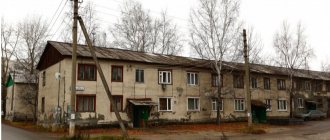In what cases is a house considered unsafe?
The definition of emergency housing is given by the Methodological Manual MDK 2-04.2004. This is a house in which load-bearing structures and more than half of the premises pose a danger to others.
The grounds for recognizing an object as emergency can be:
- natural wear and tear;
- influence of external factors;
- deformation;
- loss of design strength.
Expert opinion
Stanislav Evseev
Lawyer. Experience 12 years. Specialization: civil, family, inheritance law.
As a result of these impacts, strengthening measures must be taken. However, if the cost of restoration work exceeds the established standards, then the object is subject to demolition.
There is no need to confuse emergency and dilapidated housing. The main sign of dilapidation of a room is a high percentage of wear and tear. An object with a high percentage of wear and tear (70% or more) is considered dilapidated.
However, dilapidated housing does not pose a danger to the life and health of residents. While emergency - poses a danger to residents.
Thus, the dilapidated facility is subject to major repairs. And the emergency one is subject to demolition.
Requirements for registration of a residential single-apartment building
The main group of requirements are technical:
- number and purpose of premises (minimum - 1 living room, kitchen, bathroom, room for a heating boiler (in the absence of central heating);
- area of premises, their width;
- ceiling height (depending on the climatic region, at least 2.5 m for the first floor);
- compliance with insolation standards (the area and characteristics of glazing are determined);
- availability of communications, engineering systems (water supply, sewerage system, electricity, heating, ventilation);
- the object must be capital, placed on a foundation.
Technical standards are specified in SNiP 31-02-2001. Additionally, fire safety requirements and hygiene standards (SanPiN) are taken into account. In some cases, it is necessary to prove that the building is already used as housing (the owners permanently reside in it).
Grounds for recognizing housing as unsafe
The grounds for recognizing a residential property as unsafe are set out in Decree of the Government of the Russian Federation No. 47 of 2006 (Chapter 3).
| No. | Premises considered dangerous and subject to demolition | Comments |
| 1 | Premises located under a garbage chute or waste disposal device | An apartment is considered unsafe if under it or in an adjacent room there is a device for flushing or cleaning the garbage chute |
| 2 | Premises with windows overlooking noisy traffic routes, if the noise level cannot be reduced | The maximum permissible noise level is 55 dB during the day and 45 dB at night |
| 3 | Premises located in houses that suffered from natural disasters and cataclysms | The main condition is the unprofitability of repair work |
| 4 | Objects located close to overhead power lines | The maximum voltage value cannot exceed 1 kV/m, and the induction value cannot exceed 50 µT at an industrial frequency of 50 Hz |
| 5 | Objects located in the zone of possible man-made disasters | If it is impossible to protect the residential premises from destruction |
| 6 | Objects located in the zone of landslides, mudflows, avalanches or subject to flooding | An exception is the situation when flooding can be prevented with the help of engineering structures |
| 7 | Premises located in areas with negative sanitary and epidemiological indicators (electromagnetic fields, noise, vibration), if the indicators exceed the standards for citizens’ residence | These also include facilities located in areas of transport and engineering infrastructure, production and sanitary protection zones. |
| 8 | Apartment buildings with deformed foundations | These also include objects with deformed walls and wooden structures |
| 9 | Objects with a significant percentage of physical wear and tear, if this has led to the impossibility of safe use for residential purposes | If the level of reliability of supporting structures is significantly reduced, as a result of which strength and reliability are reduced |
Important! In everyday life, it is believed that housing can be considered unsafe due to its age. However, in practice, the age of the residential premises has no relation to establishing the breakdown of the apartment. The main sign is wear and tear.
In addition, the following indicators are not grounds for recognizing an object as dangerous:
- Lack of an elevator and garbage chute in an apartment building with more than 5 storeys.
- Compliance of the space-planning solution with outdated regulations, if this does not interfere with the normal operation of the facility.
- Lack of water supply and sewerage in the house, up to 2 storeys.
The procedure for recognizing housing as unsafe
Responsibilities for recognizing residential facilities as unsafe are assigned to local governments. Each municipality is obliged to form a specialized commission under the housing committee of the local administration.
The composition and work of the interdepartmental commission are approved by a resolution of the local government body.
The powers of the interdepartmental commission for recognizing housing as unsafe include:
- acceptance of documents;
- defining a list of additional documentation;
- recruitment of experts;
- inspection of the facility;
- making a decision to recognize the house as unsafe;
- refusal to assign an emergency status to an object.
The initiation of the process rests with the residents or owners. Local government specialists are not required to independently inspect each house without the residents’ application.
Procedure:
- Collection of documentation.
- Contacting the authorized body.
- Receipt of the act.
What documents are needed for registration?
The preparation of documents for recognition of housing as unsafe is established by local regulations of the municipality. The general list is contained in Decree of the Government of the Russian Federation No. 47 of 2006 (Article 45).
List of documentation:
- A copy of the applicant’s title document for housing. The document is provided if the right is not registered in the Unified State Register of Real Estate. Otherwise, the document is requested by the commission specialist at Rosreestr independently.
- A copy of the applicant's civil passport.
- Application for assignment of status to residential premises.
- Conclusion of the authorized organization that conducted the examination.
- Official complaints from residents about living conditions to the competent authorities.
- Certificate of recognition of the house as unsafe.
- Technical plan.
Contacting the authorized body
The owner or tenant of a residential premises can submit an application individually or collectively.
Ways to contact the authorized body:
- personally;
- by mail;
- through the MFC;
- through a representative;
The municipal service of assigning an object the status of emergency housing is provided free of charge. The period for its provision cannot exceed 30 days.
If documents are sent by mail, then it is necessary to attach a list of the attachments of the documents being sent.
If the application is submitted through a representative, then he must have documents confirming his authority:
- notarized power of attorney (representative of an adult citizen);
- birth certificate, certificate of guardian, trustee, adoptive parent (if the owner is a minor);
- resolution on the appointment of a guardian (if the owner is incapacitated).
Receiving the act
The result of contacting the authorized body is:
- issuance of an inspection report on the applicant’s living conditions;
- issuance of an act recognizing the object as unsafe or refusal to assign status.
The method of issuing the result is chosen by the applicant when filing a claim.
Possible options:
- personally;
- by mail;
- through the MFC;
- through a representative.
From the moment a positive response is received, owners and tenants of residential premises have the right to be resettled in safe facilities under the housing program.
Refusal to issue an act
If the interdepartmental commission made a decision to refuse to recognize the facility as unsafe, the applicant has the right to appeal such a decision.
Appeal procedure:
- Pre-trial . The applicant files a claim, which is sent to the head of the municipality. The results of the examination and the refusal of the interdepartmental commission are attached to the complaint. The application is reviewed within 30 days.
- Judicial . After receiving a response from the head of local government, it is necessary to prepare a statement of claim to the district or city court. The application must contain a requirement to challenge the act of the local administration and to recognize the house as dangerous for citizens to live in.
The residential building will be declared unsafe by a court decision. If there are grounds, the court will oblige the local government body to include the property on the resettlement list.
✅ Judicial practice
Tired of the promises and inaction of the authorities, residents can defend their rights in court. This usually happens if the house is not recognized as unsafe. The authorities may persist and not include the house on the list for resettlement. If the housing is in disrepair in all respects, and housing supervision is in no hurry to admit this, the only way out is to file a claim for the inaction of the authorities.
Example:
The court considered the claim of Yu.V. Kolokolnikov regarding the inaction of the Serpukhov administration. The plaintiff explained that he owns a private (individual) house within the city. The building was built in the 40s of the last century, and since then has seriously deteriorated. The plaintiff tried to make repairs, but there was no effect due to the unsuitability of the foundation and supporting parts of the building. Kolokoltsev appealed to the local administration of Serpukhov with a request to recognize the house as unsafe and subject to demolition. From there, the plaintiff received a refusal with the motivation - the property is private, not multi-apartment, the commission does not consider such housing. The plaintiff asks the court to oblige municipal authorities to inspect a private house based on an application from the owner. The court studied the case materials and granted the plaintiff's request. Explanation of the court decision - according to the law, the procedure for inspecting residential buildings for their damage and demolition provides for the work of an interdepartmental commission. According to Regulation No. 47 of January 28, 2006, no other procedure is provided for buildings in rural areas. The administration of the Moscow Region of Serpukhov is obliged to attract a commission to inspect the house. Refusal to take such action is unreasonable and illegal.
(Review of judicial practice approved by the Presidium of the Supreme Court of the Russian Federation on April 29, 2014)
Can residents count on their housing being recognized as unsafe? Practice shows that this is not always the case. The list of uninhabitable houses includes hundreds of properties in each region. The authorities simply do not have time, and often do not want to recognize the housing as subject to demolition. What should owners do? Residents will have to take care of their future themselves. This requires knowledge, legal experience and calculation of the consequences.
Contact the lawyers on our website and you will find out about a solution to your situation. The lawyer will tell you where to file a complaint, whether the house is considered unsafe, what they will give in return, and whether it is worth going to court? Responding to an acute situation will prevent disaster and loss of housing.
Watch a video about the problems with recognizing housing as unsafe and unfit for human habitation:
Attention!
- Due to frequent changes in legislation, information sometimes becomes outdated faster than we can update it on the website.
- All cases are very individual and depend on many factors. Basic information does not guarantee a solution to your specific problems.
That's why FREE expert consultants work for you around the clock!
- via the form (below), or via online chat
- Call the hotline:
- 8(800)302-39-65
— All residents of the Russian Federation - +7(495)128-69-80
— Moscow and the Region - +7(812)509-13-65
— St. Petersburg and region
- FREE for a lawyer!
By submitting data you agree to the Consent to PD Processing, PD Processing Policy and User Agreement.
Anonymously
Information about you will not be disclosed
Fast
Fill out the form and a lawyer will contact you within 5 minutes
Tell your friends
Rate ( 1 ratings, average: 5.00 out of 5)
Author of the article
Maxim Privalov
Lawyer. 2 years of experience. I specialize in civil disputes in the field of housing and family law.
Author's rating
Articles written
614
The house was declared unsafe, what to do next? How to get a new apartment or house?
The main consequence of recognizing housing as unsafe is the inclusion of owners and tenants of residential premises in the resettlement program. In 2021, the program is being implemented throughout the Russian Federation.
Funds for housing provision are allocated on the basis of co-financing from the federal and local budgets. Every year, regional authorities create lists to include citizens in the list of those in need of resettlement.
Provision is provided in order of priority. The program is being implemented very slowly. For example, as of 2021, 802 houses in the Novosibirsk region were recognized as unsafe. Since 2015, residents of 182 houses (1,800 people) have been provided with housing.
Therefore, the issue of recognizing the house as an emergency owner must be initiated independently. Delay significantly delays the fact of obtaining a new living space.
The program provides for the provision of residential premises to owners of apartments in dilapidated buildings. The owner has the right to an apartment worth no more than the residual value of the housing.
If the proposed housing exceeds the cost of the emergency one, then the owner must pay extra. Otherwise, the property will be provided under a social rental agreement.
Important! In accordance with the Supreme Court ruling of 2017 No. 6-KG17-8, the owner has the right to choose between providing alternative living space and providing compensation.
The tenant has the right to similar living space. If the administration cannot provide alternative housing, then the citizen can get a larger apartment.
However, the area is calculated based on the total area of emergency housing, and not on the provision rate per person (Definition of the Supreme Court of 2021 No. 10-КГ17-7).
In the event of a threat of collapse, housing must be provided to the tenant immediately (Definition of the Supreme Court of 2021 No. 70-KG17-22).
Let's consider what owners should do.
The owner of a residential premises must:
- Collect documents.
- Contact your local administration.
- Obtain a decree recognizing someone in need of improved housing conditions.
- Submit documents for inclusion in the program.
If the owner refuses to evict, the administration has the right to initiate legal proceedings for forced eviction. In this case, the citizen will not receive alternative housing, but compensation. The payment is equal to the residual value of the apartment (Definition of the Supreme Court of 2021 No. 5-КГ18-19).
Examination of recognition of a house as residential to recognize the house as suitable for habitation
Order an examination: +7
You can order such an independent examination from Invest Consulting. When inspecting a building, the expert performs:
- assessment of the house for compliance with current SanPiN, SNiP, fire safety standards, etc.;
- photographic recording - general plans of the house, individual rooms, building structures, etc.;
- description of materials and characteristics of building structures (foundation, walls, floors, roofing, etc.);
- fixation of the configuration and relative position, area, size, height of the premises;
- assessment of connected communications (quality of electrical installation, characteristics of heating, sewer, water supply, ventilation, and other systems);
- assessment of the location of the house on the site, in some cases - the characteristics of the site, its location.
We offer:
- travel of an expert to any point in Moscow and the Moscow region;
- fixed prices for independent examination;
- extrajudicial examination (the report is used to register a house with the administration or when filing a claim as an appendix to it);
- conducting a forensic examination (appointed by the court, which determines the list of issues, selects an expert organization, and determines the time frame for preparing the report).
"Invest Consulting" will prepare a detailed, detailed report that will contain all the information necessary to recognize the building as a residential building. Additionally, in our company you can receive legal assistance on any issues related to the registration of residential real estate.






